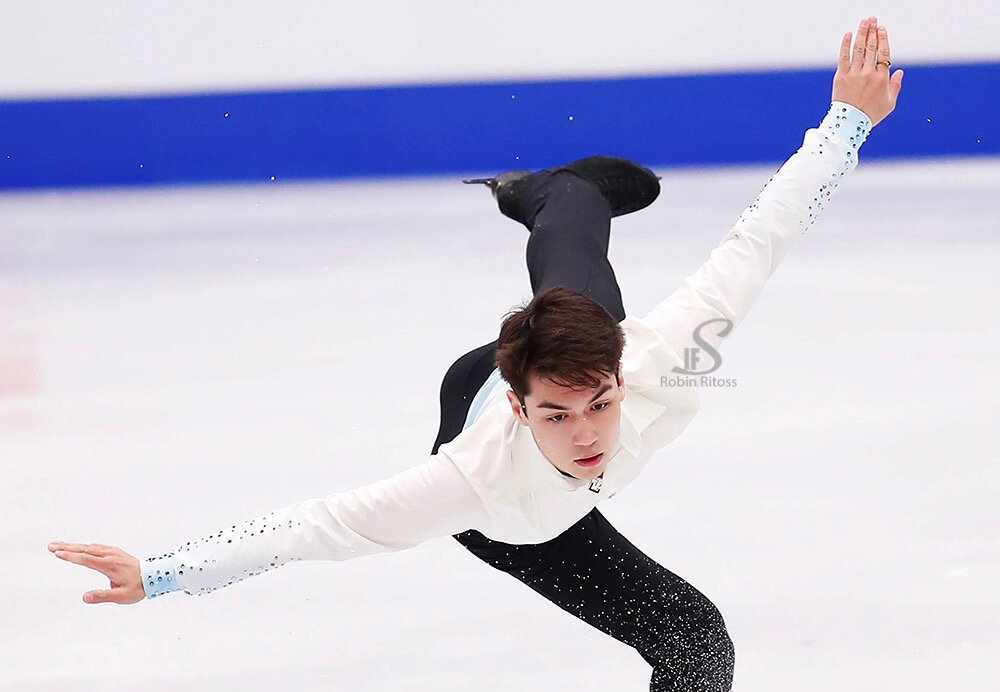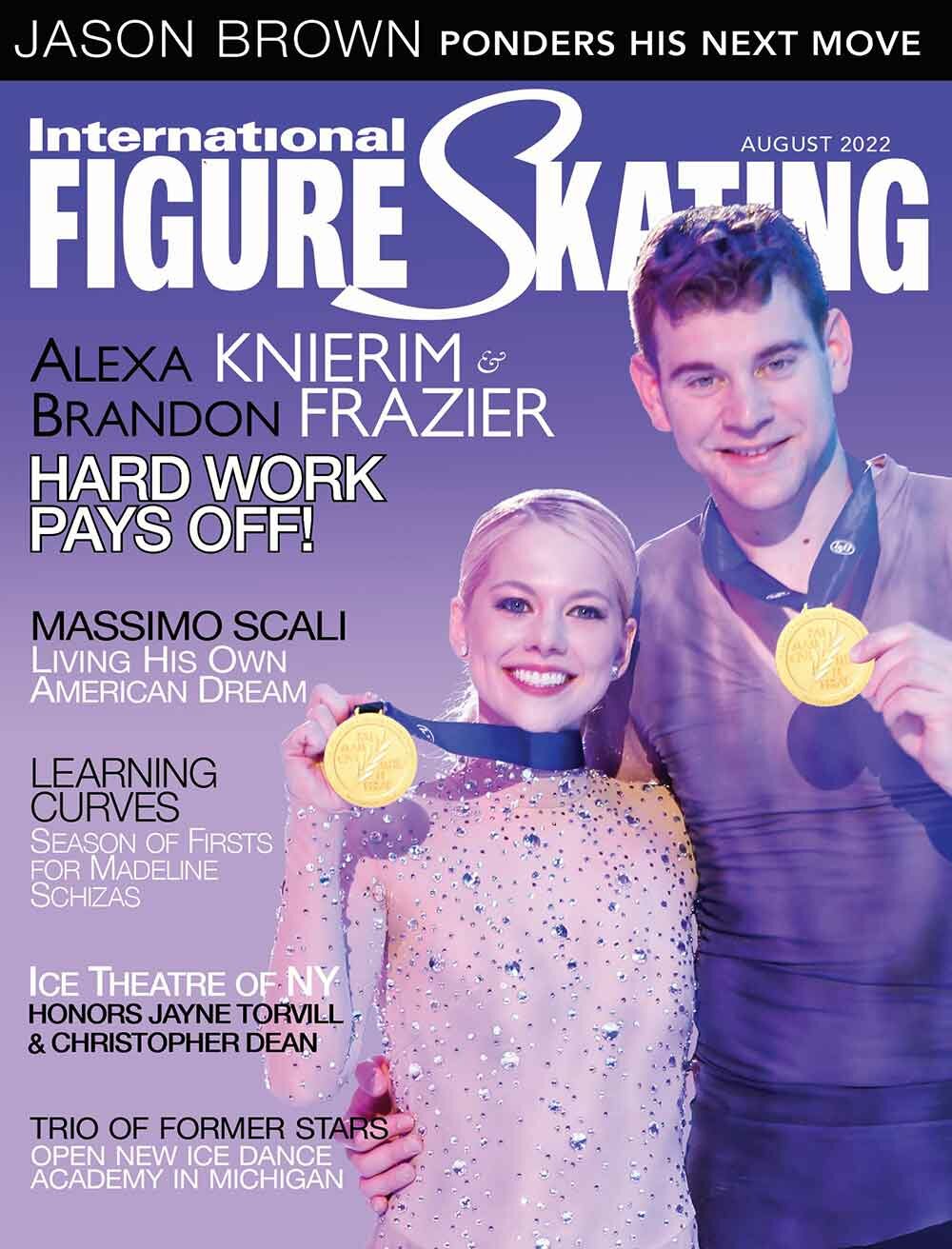
It was a call he hardly expected to receive, but it may end up being the conversation that changes the trajectory of Camden Pulkinen’s figure skating career in a major way.
In the wake of a fifth-place finish at his country’s national championships in January, the 22-year-old was listed as the second men’s alternate for the American team headed to the 2022 World Championships in Montpellier, France.
As such, Pulkinen dutifully kept up training his programs at his home base in Colorado Springs, just in case his services were needed — even if, in Pulkinen’s mind, it seemed like the longest of shots.
The United States had sent a formidable trio of men to the Olympic Winter Games in Beijing, where Nathan Chen stood on top of the podium and Jason Brown produced a sixth-place finish. But when both of those skaters decided to take a pass on the World Championships, that moved Camden Pulkinen from the on-deck circle into the spotlight.
One of his biggest career goals became very real, very fast when he learned he was headed to France for the Championships just three days before he was scheduled to depart.
“I was in a state of shock. I didn’t really believe it was happening, but in saying that it really helped me to just not think and just go do what I’ve been training,” he said during our interview a few weeks after Worlds. “I knew I was very well trained for this event. Despite being an alternate, I kept myself very healthy and kept running the programs. I know physically, I was in the right place but mentally, I was very surprised.”
The call presented Pulkinen with an opportunity to put a positive finish to a season that had been extremely rough at times. He seized upon that chance like never before, skating two solid programs in front of a highly supportive audience in Montpellier.
In the end, he produced personal best scores for both his short (89.50) and free (182.19) programs — the latter number being nearly 27 points better than his previous high, set at Skate Canada International in 2019.
Just two months earlier, he had earned a score of 146.81 for the long program at the Four Continents Championships in Estonia. What happened in Montpellier was an astonishing development, to be sure.
No wonder Pulkinen felt so overwhelmed in the kiss and cry after he saw the scores he received for his long program performance to “Bésame Mucho,” by Mexican composer Consuelo Velázquez.
“There were so many feelings. It was my first time putting everything together at an event,” Pulkinen explained in describing his reaction. “The emotions you saw were just a culmination of all the hard work I have put in and seeing it pay off. Usually, when I am in the kiss and cry, I know where the scores are going to be, based on my skate. But this time, I really had no idea. I had no base line. I had never skated this cleanly before, so seeing those huge scores was just a shock to me. I never expected that I could score that high.”
Pulkinen had stood 12 after his short program, performed to “Come From Away” from the “Moulin Rouge” soundtrack. But his standout free skate, which included a pair of quad toe jumps and triple Axels, rocketed him up to fifth place in the final standings — a stunning result for a skater that, back in November, placed last in a field of 11 skaters at NHK Trophy.
He also had a shiny piece of hardware to bring home from Montpellier, as his long program was judged to be the third best of the day, earning him a small bronze medal.
Only the eventual gold and silver medalists in the event, Shoma Uno and Yuma Kagiyama of Japan, produced higher scores in the segment. “It’s still shocking to me that I have a medal from Worlds,” said Pulkinen, who arrived in France with modest expectations. “It’s still here with me and it’s mine.”
All of that was reason enough to celebrate in France, but there was one more not-so-small milestone to mark — Pulkinen celebrated his 22nd birthday on March 25, the day between the short and long programs at Worlds. But it was not exactly party time for him on that day, given he was still in the middle of the competition.
“I couldn’t do anything really fun. I had to stay focused,” he explained. “But it was just really nice to walk around the venue and see people that knew me and have them say ‘Happy Birthday.’ It was cool that I was able to celebrate it in a stressful environment because it gave me that little bit of ease and relaxation that I think helped me for the free program.
“It was definitely a unique experience having my birthday at a big event. It’s something I hope to be able to do again.”
In an Instagram post, Pulkinen said of his efforts at Worlds: “I have given myself the best birthday present ever!”
Beyond all the reasons to celebrate, Pulkinen came away with a certain realization that he believes will help him as he moves into the next quadrennial. As much as 2022 Worlds was a dream-like ending to this season, he also sees it as a springboard to even bigger things in the future.
The personal best scores across the board were tangible proof that he has more in him. “It just shows me that I belong and that I am capable of scoring these big numbers. It gives me the confidence that, over the next four years, I can improve on those big scores. I hope to make the Olympic team (in 2026), and this is a very good starting point for me,” said Pulkinen.
“A lot of people told me I should have no expectations at this event and just go have fun and enjoy the experience. But personally, I had my own expectations. I had placement goals; I had point goals I wanted to hit and ultimately I hit those.
“I had put some pressure on myself because I knew I had to deliver for my country, and I wanted to help earn us three spots for Worlds next season. Ultimately, that was the big goal, to earn those three spots, and we did it.”
Given the way Pulkinen’s season started, it would have been difficult for him to picture this kind of ending to the campaign. He produced middling results in the fall — 14th at Finlandia Trophy, a Challenger Series event, followed by 11th and seventh-place finishes at his two Grand Prix events, NHK Trophy and Rostelecom Cup.
His early season struggles, he said, were due in great part to an injury that he carried over from last season, which cost him some valuable training time.
“I had a left ankle injury, a stress fracture coming off the 2020-2021 season. So, it was really difficult to skate,” he explained. “I was off the ice for quite a bit and when I did get back on the ice in August, it just felt like everything was foreign. It was very difficult to feel the jumps and just feel my edges. I never really felt right when I first got on the ice after the injury.
“So, at the beginning of the season, I felt a little lost and right out of the competition mindset. I struggled a lot leading into November-December. NHK was really rough for me, but I rebounded a little bit in Russia. I skated very well at U.S. nationals and was happy with that.
“The way I would describe this season leading up to Worlds is a slow and steady incline. With every event, I was slowly, slowly starting to gain confidence and come U.S. nationals, I was very comfortable with my programs.”
After his fifth-place finish at the U.S. Championships — his highest placement at that event since winning the junior crown in 2018 — Pulkinen felt like everything was finally on the right track. But then came a “poor showing” at Four Continents, where he wound up 12th in a field of 16.
However, he was determined not to let that performance linger for too long. “I worked really hard with my sports psychologist (Dr. Alex Cohen). We just worked a lot on mindfulness and aiming my attention and staying in the moment,” Pulkinen explained.
“Those are things that I try to translate outside of sport as well, which really helped me to compete. I think I always viewed sports psychology as only being sport specific, which it is. But some of the tools I’ve learned I can really take outside of skating, and it’s been helping my overall health.”
He will need that mental strength to take on his next challenge. Pulkinen has enrolled at Columbia University, a prestigious Ivy League school in New York City, where he plans to study financial economics. “I’m thinking about going into consulting, or potentially even to law school one day,” he said of his career goals.
Like U.S. teammates Nathan Chen (Yale), Karen Chen (Cornell) and Vincent Zhou (Brown) before him, he intends to continue skating while in school, a balancing act that he knows will not be easy to master. But Pulkinen is eager to tackle that challenge.
“I’m still working out the logistics. I think I’m going to have to adapt my training times a little bit, and maybe that means skating at 7:30 in the morning in New York City,” he said. “I love skating to death, but I know I have career goals outside of skating, so it’s really important for me to do this and continue my education.
“I really do want to challenge myself and see how much I can fit into 24 hours of the day. I think I’m a little bit f an overachiever that way. It may — and probably will — take a few years of painful adjustment, but I’m up for that challenge.”
And yes, he has solicited advice from his friends about how to make it all work. “I’ve spoken with all of them. They all said it’s very difficult. It’s going to be a little bit of a challenge — I know that. But I know I am in great company with other people who are doing the same thing I’m doing,” said Pulkinen, who already has two years of post- secondary education under his belt from the University of Colorado campus at Colorado Springs.
“The best advice I’ve heard from them collectively is that I have to be very determined and efficient. Those are the two words that are going to be pivotal for this transition. Ideally, I would like to stay at Columbia for two years, finish my education there and get the degree that I want. Then I can come back and really focus on skating full-time.”
The skating part of the equation is still being worked out, but Pulkinen intends to train at the Chelsea Piers rink in lower Manhattan. He plans to work remotely with his coaches, Tammy Gambill and Damon Allen, and make trips back to Colorado Springs whenever he has a break from classes at Columbia.
“I’m still working on that detail. I have some ideas, but I’m not quite ready to share them yet with everyone,” he said. “A majority of it will be remote learning, and I will have to adjust to that as well. I might have someone in New York City to oversee my training while I am out there.”
Pulkinen plans to develop a strong base during the offseason and be in great shape by the time he leaves for Columbia. “Over the summer I plan to train really hard, get new programs and really maximize all the training I can get,” he explained.
While he has “a lot of small goals” for the next quadrennial, everything points toward the biggest goal of all — the 2026 Olympic Winter Games in Italy. And Pulkinen wants to do much more than just show up in Milan for that event.
He sees the result in Montpellier as just the right starting point for that quest. “The biggest thing I took out of it personally is that I belong and with two great programs, I can contend with the best in the world.
“It was a big confidence booster for me and that was the biggest takeaway,” he said. “I’ve always known that I had it in me, but I didn’t know for sure until I did it on the big stage at Worlds. Now I have no doubt that I can do it again and I can really compete.
“Of course, I would like to be on the 2026 Olympic team, but not only that, I would also like to be in the conversation for a medal. I have a way to go with improving my spins and learning and mastering some more quads and I have a little way to go before I can truly contend with the top three in the world. But that is ultimately the goal — to be in contention for an Olympic medal.”
Ed. Note: Camden Pulkinen announced on June 15 that he has made a coaching change and will work with Rafael Arutyunyan in California this summer and Alexander Johnson in New York while he attends Columbia University, where he will begin his studies in the fall of 2022.
RELATED CONTENT:
2022-2023 COMPETITION CALENDAR





